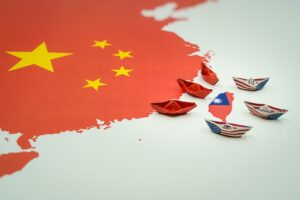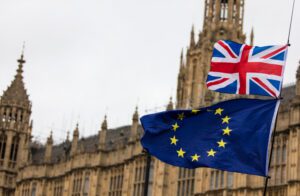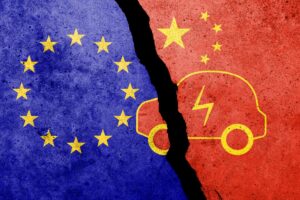WITA Board Elections
The votes are in, and we are pleased to announce the election of the 2024 class of Directors of the Board of the Washington International Trade Association. Each of these Board Members will serve a three-year term beginning July 1, 2024.
We also had several highly qualified candidates put forward by the WITA membership for consideration to the Board. We will reach out to them in the weeks to come to see how they would like to be involved with WITA going forward.
You can see a full list of WITA Board Members here.
WITA Board Class of 2024
|
1. Amanda Blunt, General Motor 2. Paul H. DeLaney, III, Kyle House Group 3. Kimberly Ellis, Monument Advocacy 4. Nasim Fussell, Lot Sixteen |
5. Katrin Kuhlmann, New Markets Lab 6. Katie Morley, The Coca-Cola Company 7. Alex Perkins, Mehlman Consulting |
Global Supply Chains at Risk Without New Rules for Digital Trade
Much ink is being spilled on predictions of ‘deglobalisation’ and restructuring of supply chains, but frenzied commentary over trends such as ‘re-shoring’ and ‘near-shoring’ tends to obscure the reality that trade flows have always been fluid and that global trade is back to pre-pandemic levels.
Global trade recovery remains fragile. Geopolitical tensions, spillover from regional conflicts, rising populism and protectionist policies are putting unprecedented pressure on globalisation.
The prospect of a complete breakdown in relations between the United States and China adds weight to any pessimism. Each day brings further threat — or the reality — of unilateral trade measures. While legitimate concerns may undergird these measures, such as climate considerations, the net effect is chipping away at governments’ faith in the global rules-based trading system. This is creating a vicious cycle of more barriers and more protectionism.
Global business priorities have not shifted since the WTO was founded 30 years ago. Cohesive, multilaterally agreed rules for international trade that provide certainty and predictability remain a fundamental demand from traders around the world.
The WTO, despite its flaws, has proven to be the single cohesive vehicle able to attract multilateral participation — from countries across the world at every stage of development — to address global trade challenges. The need for such an institution has grown with time. For example, effective multilateral dialogue at the WTO level is required to resolve the unintended consequences of novel environmental legislation, such as the EU’s carbon border adjustment mechanism and new rules on deforestation, particularly as they affect small businesses in developing countries.
Against growing threats to the system, the urgency of reforming the WTO grows each day. Its rulebook must be updated to meet the challenges and opportunities of the 21st century — its rules enforced and its agreements effectively monitored. Reform must be tackled consistently with an eye towards lowering trade barriers and upholding current commitments. And this must be done in cooperation with the private sector.
06/23/2024 | John Denton | East Asia Forum
China Is Flexing Military Muscle Again—and Reminding the US It Needs to Diversify Critical Supply Chains
Following is an excerpt from an article by Jeffery Kucik & Mark Kennedy, published by the Wilson Center’s Wahba Institute for Strategic Competition.
China’s latest military exercises near Taiwan, during which it simulated a full-scale attack, just gave the US even more reason to diversify its supply chains.
While China’s saber rattling may be performative, it serves an important reminder. If a “Taiwan contingency” was triggered today, it would leave the US desperately short of goods vital to economic security, including pharmaceuticals, critical minerals, and semiconductors. And while many economies in Southeast Asia already provide alternative sources of supply, uncertainty in the region means the US must also cultivate supply chains outside the “weapons engagement zone,” the area within immediate reach of China’s vast missile arsenal.
Luckily, there are opportunities to diversify much closer to home. But taking advantage of them requires a shift in US policy toward more active engagement with strategic partners throughout the Americas.
…Rather than trying in vain to reshore everything, America must remember that its allies and partners can help guarantee its economic security—especially those in the region.
A more proactive, outward-looking strategy involves two priorities. One is trade agreements. Allies have been exasperated by the perceived uncertainty in US policy in recent years. The US must reboot trade deals to reassure its economic partners. Investments to provide new, reliable sources of supply require reliable, long-term access to America’s market. Only concrete guarantees will provide the economic incentives to align production with critical US needs.
At the same time, America’s development finance efforts should be coordinated with trade deals to help partner countries bolster capacity. China has invested hundreds of billions in trade-enabling infrastructure across emerging markets and developing countries, plugging countries into a China-centric supply network and cultivating export markets. The US already has commenced similar efforts in Africa’s Lobito Corridor and in the Philippines Luzon Economic Corridor. These efforts should be expanded, especially in the Americas.
06/20/2024 | Jeffery Kucik & Mark Kennedy | Wilson Center
The UK’s Main Political Parties Both Need to Talk About EU Trade
Although the Conservative and Labour parties are both making a policy promise a day ahead of the 4 July general election, none of these proposed policies is addressing the UK’s international trade. This is leaving many important and cross-cutting aspects of trade untouched. Both parties’ reluctance to talk about trade with the EU may well explain the general lack of focus on this area.
With barely two weeks until polling day, it is worth exploring why the incumbent Conservatives and their main challenger Labour are both avoiding the topic of trade relations with the EU – and other key areas in international trade that deserve the next government’s attention.
The post-Brexit economy and UK-EU trade
While the UK may have notionally ‘taken back control’ over policy areas such as trade and migration, as campaigners for Brexit insisted it would, empirical evidence suggests that leaving the European Union has negatively affected the UK economy. Slower GDP growth and slower growth in trade than comparable economies are key indicators of this.
The UK is a very open economy and the value of trade relative to GDP is close to 70 per cent. More than one-fifth of UK jobs are directly or indirectly associated with the exporting activities of UK firms. Average wages tend to be higher in exporting sectors and importing offers the country access to a greater range and quality of consumer goods and intermediate inputs. All these factors are important drivers of prices, of UK firms’ competitiveness, and of future investment and economic growth in the country.
Approximately 50 per cent of UK trade is with the EU, and many UK firms’ supply chains are closely linked to the EU. Hence, it is hard to discuss international trade (policy) without mentioning EU trade (Brexit). As such, it is clear to see why parties struggle to discuss international trade without talking about the UK’s trade and trade relations with the EU.
Read the Full Expert Comment Here
06/21/2024 | Professor Michael Gasiorek | Chatham House
Imposing Tariffs on Chinese Electric Vehicles Will Make the EU’s Transition Slower and More Expensive
On 12 June, following an anti-subsidy investigation, the European Commission disclosed that it would provisionally impose import tariffs ranging from 27.4 to 48.1 per cent on electric vehicles (EVs) from China. This comes a month after the United States announced that their own tariffs on Chinese EVs would rise to an unprecedented 102.5 per cent.
The Commission’s actions on EVs may not be the last taken against clean technology from China, with trade measures having recently been considered for two more major pillars of Europe’s energy transition.
An anti-subsidy probe into Chinese solar panel manufacturers bidding for a public project in Romania was closed after the targeted companies withdrew from the process.
An investigation into Chinese wind turbine suppliers is ongoing. Both were launched under the new Foreign Subsidies Regulation.
The risks of tariffs on decarbonization technologies
The EU is anxious to protect its companies from what it sees as unfair competition. It has bitter memories of the early 2010s, when cheap Chinese panels all but destroyed the European solar industry.
The EU is right to identify clean technology as a crucial strategic industry, and to take action to mitigate the negative consequences of surging imports from China. Against a volatile geopolitical backdrop, it can be worth paying a premium for goods made at home.
But decarbonization technologies like solar panels, wind turbines and electric vehicles share a characteristic that sets them apart from other traded goods. When swapped for fossil fuel alternatives, they reduce the quantity of planet-warming gases being pumped into the atmosphere. They are needed in vast quantities, and in very short order, to give any chance of avoiding the worst impacts of climate change.
Read the Full Expert Comment Here
06/13/2024 | Chris Aylett | Chatham House
WITA – We put the community in trade community.
Information about upcoming WITA and trade community events






